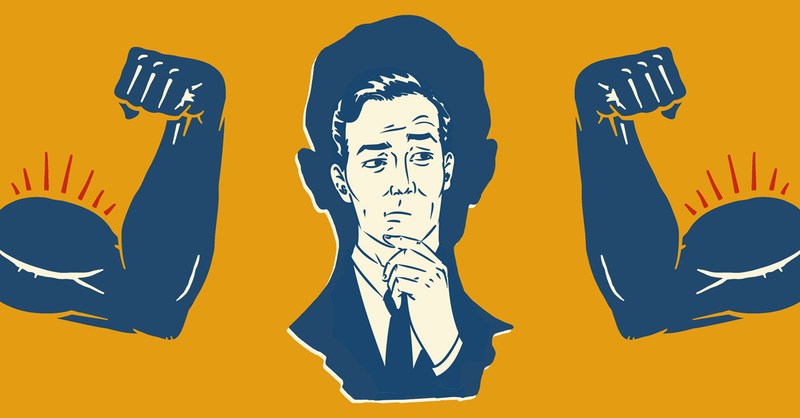I’m a man. On writing this, the first thing I wonder is what you think of me when you read that sentence. Do you think I’m saying it with my deep, husky voice, rumbling down from somewhere above 6ft3, or do you think I’m saying it in a light breezy voice as if it just happened to hop out my mouth, without me even thinking about it?
I’m a man. Or perhaps you read it in the voice of one of your friends, in your own voice, or maybe your boyfriend’s? What about… ”We’re men.” who do you imagine is saying that? In my head, as much as I hate to admit it, it’s a group of large, miserable looking men with deep voices, who are all dramatically backlit. We’re men.
However, when I think of all the men I know and I imagine them for some reason all speaking this phrase, not one of them is the muscle man I have pictured in my head.
The men I know are a huge variety, from understated, spectacled men to kind, laughing men to grinning, shark-like men that I can only describe as slimy. Not one has a permanent look of misery, a particularly deep voice or a constant and dramatic backlight. Even though we are all aware that the definition of masculinity has changed, the word ‘man’ or ‘men’ still carries a lot of stereotypes and I hope in future we can change the connotations of “I’m a man.” or ”We are men.” to mean the actual man and men we know.
As soon as I was invited to write this article, I decided not to. I didn’t think my experience of being a man was the right experience; in essence I didn’t think it was ‘masculine’ enough. It was only when I was writing my reply to my boss, telling her I didn’t think I was the right person to write this, that I realised why I was wrong. I thought of the type of man I would view as ‘masculine’ and expect to write an article on masculinity and realised it was the classic cliché, muscles, testosterone etc., which I don’t fit. Then when I thought of the men I actually know, I realised none of them fit this description either, and that the definition of masculinity should include and encompass male experience as a whole. However, we continue to define masculinity by a small subset of men with large muscles and grumpy dispositions.
This is not me. I’m camp, I’m skinny and I own eight boxes of herbal tea. However, that doesn’t mean I’m not masculine; rather, it means the way we define masculine is wrong. It doesn’t make sense to hold men to our definition of masculinity, we should hold our definition of masculinity to the men it describes, which should be all of them.
Yet, once you try and do this it becomes clear that there’s actually no such thing as masculine; on account of every man being so different, you can’t hope to convey the hugely conflicting and contrasting personalities and characteristics of all the men of 2019 with one word. It would be like trying to decide what colour a ball pool is. Describing a man as masculine is like trying to convey whether it’s snowing, raining or sunny outside by simply saying it’s ‘weathery’, it doesn’t work. With the weather being so distinctly variable, using the word ‘weathery’ to describe it is about as useful as saying nothing at all.
Saying the word masculine is an equally pointless use of language. Because every man is so different, trying to truthfully describe every single male experience in three syllables can never work. The word is useless.
When you try to use masculine to mean what it should mean, it doesn’t mean anything at all, because there’s no such thing as a defining trait of all the males in existence, there’s no such thing as ‘masculine’.
Andy Gregory

